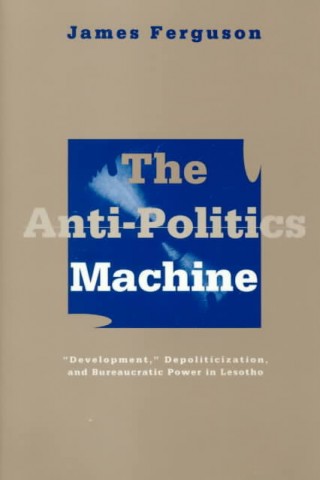Constructing “Development” (Ferguson, 1990)
Quotes on the construction of "development" from Ferguson's influential Anti-Politics Machine (1990):
- "The argument, in brief, is the following: "development" institutions generate their own form of discourse, and this discourse simultaneously constructs Lesotho as a particular kind of object of knowledge, and creates a structure of knowledge around that object. Interventions are then organized on the basis of this structure of knowledge, which, while "failing" on their own terms, nonetheless have regular effects, which include the expansion and entrenchment of bureaucratic state power, side by side with the projection of a representation of economic and social life which denies "politics" and, to the extent that it is successful, suspends its effects. The short answer to the question of what the "development" apparatus in Lesotho does, then, is found in the book's title: it is an "anti-politics machine," depoliticizing everything it touches, everywhere whisking political realities out of sight, all the while preforming, almost unnoticed, its own pre-eminently political operation of expanding bureaucratic state power." (p. xiv-xv)
On purposeful framing:
- "The peculiar representation of Lesotho which emerges from the World Bank report must not be understood as simply the product of mistakes or errors. There are, indeed mistakes and errors in the Report just reviewed, and there nearly as many in most other such reports. But these mistakes and errors are always of a particular kind, and they almost invariably tend in predictable directions. The statistics are wrong, but always wrong in the same way; the conceptions are fanciful, but it is always the same fantasy." (p. 55)
- "Geography may seem a strange way to go about explaining why one group of people is poor while its neighbours are rich. After all, we would not seek to explain why the people in the South Bronx are poor by noting that the South Bronx lacks natural resources and contains more people than its land base can support. The South Bronx is a slum, and that is a social fact, not a geographical one." (p. 62)
On the state and politics:
- "The state itself, meanwhile, tends to appear as a machine for implementing "development" programs, an apolitical tool for delivering social services and agricultural inputs and engineering economic growth. Military metaphors – successful "operations," well-executed "attacks" and "assaults" on "targets," etc. – abound, and the image is of a single, unitary, righteous army doing battle against a universal enemy. Issues involving the political character of the state and its class basis, the uses of official position and state power by the bureaucratic elite, the functions of bureaucratic "inefficiency" and corruption – matters which are central to academic understandings of modern African states – are nowhere to be found in the "development" version of Lesotho. The state represents "the people," and mention of the undemocratic nature of the ruling government, or of the political opposition, is studiously avoided." (p. 65)
- "A very simple example will illustrate what this means. "Development" discourse in the period under review made no reference to local politics in Lesotho, or to the fact the ruling government was unpopular and unelected. This was not something which is unknown to the "development" writers; it was however something that was necessarily left unspoken in a World Bank report. In a more subtle way, there are a host of statements and lines of thought which are, if not actually forbidden, at any rate profoundly unhelpful in the discourse of a "development" agency. Writers who produce such discourse would not necessarily be censored or suppressed, as would the unfortunate who mentioned local politics, but they would find their analyses quickly dismissed and discarded as useless, as indeed they would be." (p. 68)
Featured Posts
Tags
Globalization
Capitalism
Gender
Human Rights
Ethics
Fellowship
Qatar
Education
Ethnography
decolonization
Power
Development Studies
Books
Islam
Conflict
Land
Institutions
Ethiopia
Climate change
Culture
Racism
Policy
Post-doc
Development
Inequality
Colonialism
Economics
Rural Development
Middle East
South Africa
Migration
Leadership
Ideology
Revolution
Poverty
Agriculture
Civil society
Resilience
International development
Interdisciplinary
Politics
Colonization
Sustainability
Democracy
Anthropology
Governance
Food Security
History
Participation
Africa

